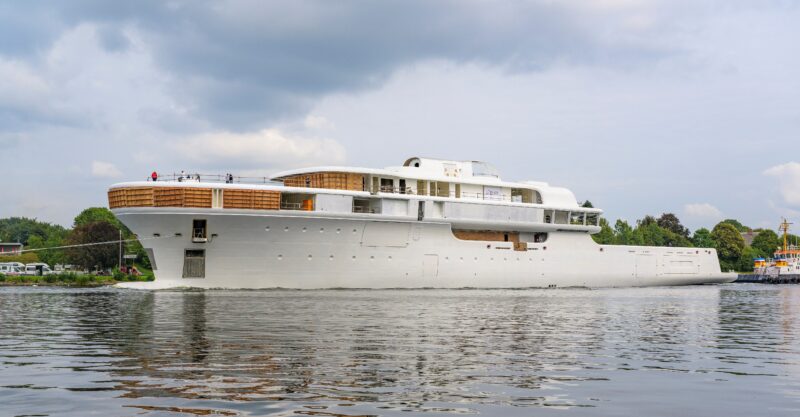How serious is yachting about sustainability?

The superyacht industry is making progress on sustainability.
Just as turkeys are famously unlikely to vote for Christmas, so the superyacht industry is unlikely to downplay its progress in sustainability.
The mood music is publicly positive but as the COP28 climate summit gets under way in Dubai this week, it’s worth checking in again. Are yachting’s pronouncements on sustainability just for effect, or does it realistically want to contribute to protecting the environment?
Sign up for the Superyacht Investor newsletter
The superyacht industry itself cares “more and more”, according to Michael Breman, sales director, Lurssen.
“We have a customer who is building a boat with us [114.2m Project Cosmos] that has a hydrogen fuel cell based on methanol, which will be launched in 2025,” Breman tells Superyacht Investor.
“That’s a first. That’s a sign there are people willing to take steps to develop new technology and take us away from the fossil-based economy.”
READ: How bankers help fuel the green revolution

Lurssen superyacht Project Cosmos will run on hydrogen fuel cells powered by methanol.
‘Higher-level discussion’
Breman believes most people in the industry “understand what is happening in the world” and are keen to play their part in developing an environmentally friendly product. He says the industry is already “pretty sustainable” but says that talking about it too much can leave it open to accusations of “greenwashing”.
“The proof will be in the pudding,” he says. “Once these things are out at sea and working, hopefully, there will be further progress from there.”
Feadship is also on a journey to build a carbon-neutral superyacht by 2030, driven by “significant social pressure” and a need to position the business for the future, says Giedo Loeff, head of R&D.
Over the lifetime of a superyacht, 94% of its emissions will come from fuel used for propulsion and the hotel load, with 4% from upstream and 2% from their production, says Loeff.
READ: 6 brokers on headwinds facing yachting
For Loeff, the entire topic “circles around the fuel”, both in terms of technology and scaling up the distribution chain.
“We are not producing the fuel, we are not buying it, we can only design and build yachts that can operate on certain fuels so it’s more of a higher-level discussion,” adds Loeff.
“We as a market are not going to change that. It’s happening so we are adjusting our designs but we need to remain flexible so those yachts will still be able to run on diesel or non-fossil fuel because they still need to be able to sail around the globe and go to Polynesia or wherever.”
READ: Cecil-Wright on ‘acceptance’ and the art of a broker

‘Sitting ducks’
Theo Hooning, secretary general of the Superyacht Builders Association (SYBAss), acknowledges the innovative work that is being done and says the industry needs to “come to owners with solutions to solve this environmental issue”.
“The industry has to initiate this to protect itself,” he says. “If we have the right answers and the right methods, we will also have clients who are motivated to have the cleanest yacht in the world.”
Establishing an energy rating for yachts in the same way that exists for cars will be one way of helping owners make informed choices, and SYBAss is working with others in the industry to come to an ISO standard for this. The Water Revolution Foundation is also instrumental in working towards a greener future for yachting.
READ: Pendulum swings in ‘hungover’ mid-market
But are bespoke hydrogen fuel-cell powered superyachts just islands in a stream flowing in the wrong direction?
“Among superyacht owners, like any consumer population, there will be those ahead of the curve, those that are following and the ones that will change when the rest of the population goes with it,” says Natalie Quevert of SEA Index, the Monaco-based environmental group working to help yacht owners understand their eco impact.
“For us it’s to help the ones who are trying to do something have more clarity because it’s not there and it’s hurting the industry. They are sitting ducks basically. We want transparency for the consumers, albeit very wealthy ones.
“Until we have energy intensity ratings it’s detrimental to the entire industry. “

Raphael Sauleau, CEO of the brokerage IYC, says that the messaging around the industry is “extremely important”.
“It’s not just so-called rich billionaires on a yacht,” he says. “It’s an industry which provides a lot of jobs, which provides a lot of resources to the countries and islands where these yachts are going.
“In terms of sustainability, we need to make people understand there is a lot of work being done in yachting, lots of innovation by shipyards and by owners. Their financial bandwidth is quite important. They are the ones able to try to find new solutions to make their yacht more sustainable.
“Now, we have to be careful not to push it. Yachting will never be fully green, so we need to be very objective and correct in the message we deliver to the world and just say, in reality, the work that is being done to make it greener is already a good way forward.”
Subscribe to our free newsletter
For more opinions from Superyacht Investor, subscribe to our email newsletter.

